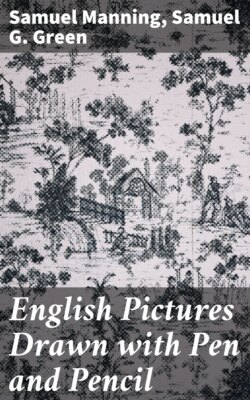Читать книгу English Pictures Drawn with Pen and Pencil - Manning Samuel - Страница 12
На сайте Литреса книга снята с продажи.
Original Size
ОглавлениеThe river after leaving Gloucestershire divides, in many a winding, the counties of Oxford and Berks. The hills of the latter county, with their wood-crowned summits, pleasantly bound the view to the south; Farringdon Hill being for a long distance conspicuous among them. Half-way between Lechlade and Oxford is the hamlet of Siford, or Shifford—one of the great historic spots of England, if rightly considered, although now isolated and unknown. For there, as an ancient chronicler commemorates, King Alfred the Great held Parliament a thousand years ago.
"There sat at Siford many thanes and many bishops,
Learned men, proud earls and awful knights,
There was Karl Ælfric, learned in the law,
And Ælfred, England's herdsman, England's darling,
He was King in England.
He began to teach them how they should live."
Not far off is New Bridge, the oldest probably on the Thames. But it was "new" six hundred years ago. Its solid construction shows that it was once a great highway; while its buttresses, pointed up the stream, betoken the power of the floods which the careful draining of later days has done so much to moderate.
A short distance farther, the Windrush flows down from the north, by Bourton-"on-the-water," Burford and Witney, to unite with the broadening river; then the Evenlode, which the traveller by the Oxford, Worcester, and Wolverhampton Railway so often crosses and recrosses in his journey.
Throughout, the river is carefully adapted for the purposes of a navigation now little needed. The occasional locks and the frequent weirs break the level, and the latter especially—sometimes miniature rapids or waterfalls—add picturesqueness to the scene. An expert oarsman may descend them all with safety; but many prefer to lift the boat on to the bank and drag it down to the lower level. These are interruptions to the journey, which, on the whole, is very enjoyable. Should the tourist have time at command, he may diverge to the right hand or to the left, to scenes of rich beauty or historic interest. Cumnor Hall, a name familiar to all readers of Sir Walter Scott from the tragic fate of Amy Robsart, lies a little way to the right of Bablock Hythe Ferry; Stanton Harcourt a short distance to the left. At the latter place Alexander Pope once resided, in a tower of the old mansion, which time or reverence has spared, in the ruin of almost all the rest. A pane of glass, in one of the tower windows, bore an inscription from the poet's own hand. "In the year 1718, Alexander Pope finished here the Fifth Volume of Homer." The pane is now at Nuneham Courtney, the mansion of the Harcourts. At Bablock Hythe Ferry the traveller is scarcely four miles from Oxford by the direct road; but if he keep to his boat, which he will not regret, he will find the distance fully twelve. The detour leads him first past the lovely wooded slopes and glades of Wytham Abbey, then to the scanty ruins of Godstow Nunnery, with its memories of Fair Rosamond. But we must not linger now, though opposite to the ruins a charming country hostelry offers its attractions, and the trout are leaping in the stream; for we are on our way to Oxford.
The impression which the first sight of this fair and ancient city makes upon the stranger is probably unique, in whatever direction he first approaches it, and from whatever point he first descries its spires and towers. True, of late years the accessories of the railway invasion, so long resisted by the University authorities, have given a new aspect to the scene; but nothing can quite destroy the stately dignity and venerable calm. The traveller who approaches by the way we are describing, receives the full impression. As he floats along the quiet surface of the river, the stately domes and towers come suddenly in sight, and the green railway embankment in the foreground scarcely impairs the antique beauty of the picture.
Oxford is probably Ousenford—the ford over the Ouse or "Water." Its waters indeed are many, and almost labyrinthine; but we get clear of the river at Hythe Bridge, and care for awhile only to explore Colleges, Halls, and Libraries; pausing before the Martyrs' Memorial, to breathe the hope that "the candle" once lighted there may still brightly burn, while Keble College, farther on, is a memorial of one, who though of another school of thought from ourselves, has given musical and touching expressions tu the deepest thoughts of devout hearts.
